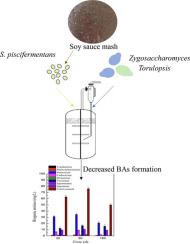Food Research International ( IF 7.0 ) Pub Date : 2020-06-12 , DOI: 10.1016/j.foodres.2020.109436 Jian Guo , Wen Luo , Jun Fan , Taikei Suyama , Wen-xue Zhang

|
With the increasing popularity of soy sauce containing high amounts of amino acid nitrogen (AAN) in China and the positive correlation of biogenic amines (BAs) with AAN, reducing BAs formation during soy sauce fermentation has become an urgent task. In this work, the effect of salt-tolerant yeasts and Staphylococcus piscifermentans on BAs formation was extensively studied. Combined inoculation for different osmotolerant yeast strains indicated that Z. rouxii CICC 1417 and T. candida CICC 1019 co-inoculation produced the lowest amount of BAs (89.43 mg/L). Furthermore, co-inoculation of soy sauce mash with S. piscifermentans and salt-tolerant yeasts reduced the BAs production by 31.51% under laboratory-scale experiments. Only 133.40 g/L BAs were produced after S. piscifermentans inoculation in 50-T fermentator, and this value was 63.25% lower than that of the control. Most of the alcohols, aldehydes, phenols, and esters were increased, whereas bacteria, such as Pediococcus, Weissella, and Streptococcus, were inhibited and thus reduced BAs formation. The increased abundance in Zygosaccharomyces and Pichia may contribute to the improvement in volatile compound production. These findings reveal the high potential of the co-inoculation of S. piscifermentans and salt-tolerant yeasts for soy sauce production with limited BAs formation.











































 京公网安备 11010802027423号
京公网安备 11010802027423号